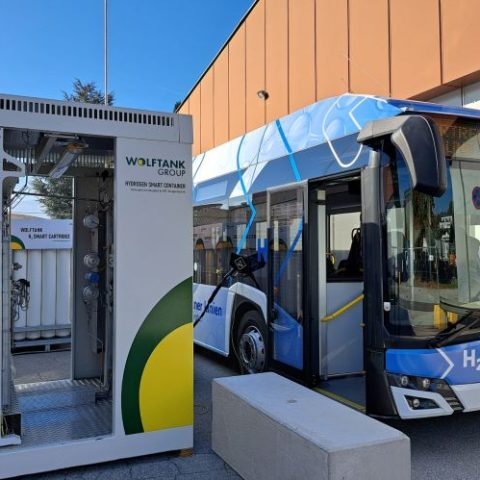Tper – Wolftank consortium awarded construction of two more hydrogen fueling and production plants
TPH2, a consortium company made by municipal operator Tper in Bologna and the Austrian group Wolftank, has been awarded the construction of two additional refuelling and production plants. These will help ‘feeding’ the fleet of 130 fuel cell Solaris buses circulating by the end of 2026, starting from the end of 2024. The Wolftank Group […]

TPH2, a consortium company made by municipal operator Tper in Bologna and the Austrian group Wolftank, has been awarded the construction of two additional refuelling and production plants. These will help ‘feeding’ the fleet of 130 fuel cell Solaris buses circulating by the end of 2026, starting from the end of 2024.
The Wolftank Group was chosen in a selection procedure as an operational-industrial partner due to its expertise in integrated hydrogen refuelling systems.
When fully operational, there will be four plants (three in Bologna and one in Ferrara) for the refuelling and, in part, the production of hydrogen managed directly by Tper.
The overall interventions are covered by Next Generation EU funding and Italian PSNMS funding, besides self-financing resources from Tper.
Tper – Wolftank will produce hydrogen for buses in house
Tper has the goal of having a 12% hydrogen fleet in its energy mix, a strategic choice to ensure the necessary flexibility of use and utilisation for medium-distance travel in urban and suburban areas, the operator states.
A new important agreement was signed in these days by Tper for the design, supply and installation of the plants for the hydrogen fleet that will enter service in the two basins by 2026. Tper has appointed TPH2 scarl, a consortium company owned by Tper itself and HGeneration srl (Wolftank Group), to build the infrastructure in Bologna – Due Madonne and Ferrara for a value of EUR 15.5 million. A first partial contract had already been awarded in June 2023.
With the new assignment, Wolftank will design, build and start up these high-tech plants with its own expertise and solutions.
The process for the remaining plants continues through the definition of technical-economic feasibility plans and the completion of the authorisation process.
Finally, the process for the remaining facilities continues through the definition of technical-economic feasibility plans and the completion of the authorisation process.








